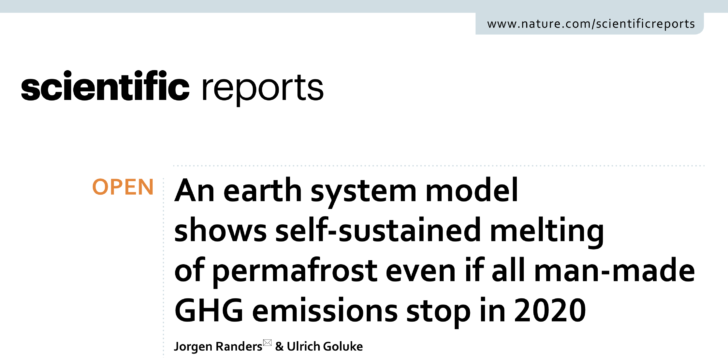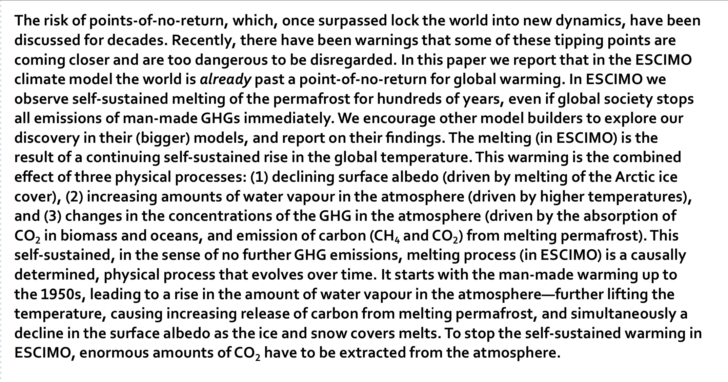“To prevent the projected temperature and sea level rises, the authors suggest that all anthropogenic greenhouse gas emissions would have had to be reduced to zero between 1960 and 1970.”

The media release and abstract are below. Online paper is here.
###
Climate change: Ending greenhouse gas emissions may not stop global warming
SCIENTIFIC REPORTS
Research News
Even if human-induced greenhouse gas emissions can be reduced to zero, global temperatures may continue to rise for centuries afterwards, according to a simulation of the global climate between 1850 and 2500 published in Scientific Reports.
Jorgen Randers and colleagues modelled the effect of different greenhouse gas emission reductions on changes in the global climate from 1850 to 2500 and created projections of global temperature and sea level rises.
The modelling suggests that under conditions where anthropogenic greenhouse gas emissions peak during the 2030s and decline to zero by 2100, global temperatures will be 3°C warmer and sea levels 3 metres higher by 2500 than they were in 1850. Under conditions where all anthropogenic greenhouse-gas emissions are reduced to zero during the year 2020 the authors estimate that, after an initial decline, global temperatures will still be around 3°C warmer and sea levels will rise by around 2.5 metres by 2500, compared to 1850. The authors suggest that global temperatures could continue to increase after anthropogenic greenhouse gas emissions have reduced, as continued melting of Arctic ice and carbon-containing permafrost may increase the greenhouse gases’ water vapour, methane and carbon dioxide in the atmosphere. Melting of Arctic ice and permafrost would also reduce the area of ice reflecting heat and light from the sun.
To prevent the projected temperature and sea level rises, the authors suggest that all anthropogenic greenhouse gas emissions would have had to be reduced to zero between 1960 and 1970. To prevent global temperature and sea level rises after greenhouse gas emissions have ceased, and to limit the potentially catastrophic impacts of this on Earth’s ecosystems and human society, at least 33 gigatonnes of carbon dioxide would need to be removed from the atmosphere each year from 2020 onwards through carbon capture and storage methods, according to the authors.
###

It’s easy to draw lines that extend forever in a particular direction (the formula is well known). It’s much harder to create a mathematical model that actually matches reality as it is observed. Of course, time and time again, it’s been obvious that the numerous models predicting “global warming” are all inaccurate. We know that the earth has a history of “ice ages” (that began when the continents moved into their current positions due to tectonic movements). Apparently, it is little understood what triggers these events. The very heating (claimed) by “anthropogenic climate change” may actually lay the foundation for the beginning of the “global cooling” that takes the earth into its next ice age. In either event, I expect not to be present to see if these estimates prove to be correct. At the present time, they do allow some people to attempt to tell other people how to live. And I object to that.